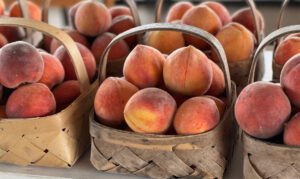It’s a debate that has raged on since the dawn of time: which is better — male or female? Through the years, I’ve just accepted it’s the luck of the draw which one you end up with. Well, no more.
Aided by some sweet and sticky research this past weekend, the debate about which is superior and more desirable has finally been resolved. Depending on what part of the country you’re from, you may come up with a different conclusion, and that’s okay.
But in our house, it was almost unanimous: females are sweeter and much better than males. Guess which one of us disagreed with all the rest?
With July 4th being only a week away, we are planning an outdoor cookout. Aside from hot dogs, hamburgers, and chips, the star of any summertime meal is the watermelon. Living in the South all my life, the cooling-off effects and sheer fun of watermelon are unparalleled. But which one do you buy?
They come in many different sizes, colors, some with brown spots, some without, and yes, even different sexes. For our research, we only concentrated on the two most common melons we’ve all eaten as kids: round vs. long.
Growing up back on Flamingo Street, we kids knew it was the official start of summer when one of us kids picked out watermelons. Even though Dad had a huge garden in the backyard during those seven years we lived on Flamingo, he only grew watermelons once.
“Vines go everywhere. Takes up too much room.” Instead, he always took us to the State Farmer’s Market. It was tradition.
Another tradition was the big argument during the half-hour drive. We’d fight over which melon would be the best and which one of us would pick it out. By the time we reached the market, it was decided each of us five kids would pick out our own melon.
For us kids, the open-air Farmer’s Market seem to stretch forever with aisle after aisle of farmers unloading their trucks into their display area. To me, the busy farmers resembled ants scurrying over a piece of candy dropped in their ant hill.
Like a multi-color sea, each booth held every kind of produce from the garden, and all had a display of watermelons and cantaloupes. Dad allowed each one of us to pick out our own melon, educating us on the difference.
“The long male ones are full of water; the small round green ones are the sweetest. They’re the females and are loaded with the best spitting seeds. But the round black ones are the best because they’re sweet, juicy, and have deep red firm meat on the inside. For all melons, a large yellow splotch on the bottom is very important because it means the melon has been on the ground for a long time and that makes it sweeter. And the stem needs to be intact, dry and brown, but not green. Green means it was picked too early. Make sure you ‘thump’ the melon and pick it up. A deep sounding thump and heavy melon means it’s nice and juicy. And whatever you do, stay away from those seedless ones. They’re just mealy on the inside and have little taste.”
Dad never paid for our six melons (six because we always dropped one before getting back to the car). Instead, he swapped extra produce from his garden. His prolific garden kept us in watermelons all summer long. Each of those seven summers spent growing up on Flamingo was filled with endless cold watermelon fun.
For us, unless you had the sticky juice from watermelon running down the front of your shirt as you try to out spit seeds at your siblings, it just wasn’t summer.
A grand seed-spitting contest is something we did with the Girly Girls, and during our recent melon research, The Wife also took part in our taste test. Unlike us, she’s fonder of the long watermelons because on the inside the melon is white near the rind — the round melons are red. When she told me this, I smiled, “So you like the male ones the best?”
The Wife replied, “Actually, while they’re female and male flowers on the vine, watermelons only come from the female flower. That means all watermelons are female. Some are just sweeter than others.”
I gave her a kiss and said, “Some females are much sweeter than others. Now that’s something we can both agree on, my love.”
[Rick Ryckeley has been writing stories since 2001.]












Leave a Comment
You must be logged in to post a comment.